Summary: Kirk, Spock, McCoy and the highly-driven Commissioner Nancy Hedford are travelling to get urgent medical treatment for the Commissioner, who has been stricken with a life-threatening illness. However, their shuttle encounters an anomaly and is pulled towards a planet where the crew finds Zefram Cochrane, inventor of warp space travel.
It turns out Cochrane, who was presumed dead two hundred years earlier, has been kept in a state of eternal youth by an alien energy being known as the “Companion”. When fighting the Companion doesn’t work, Kirk tries to negotiate with her and they realize she is in love with Cochrane. They convince the Companion to let Cochrane and everyone else go, but instead she takes over the nearly-dead Commissioner Hedford’s body and Cochrane decides to remain on the planet with his new girlfriend.
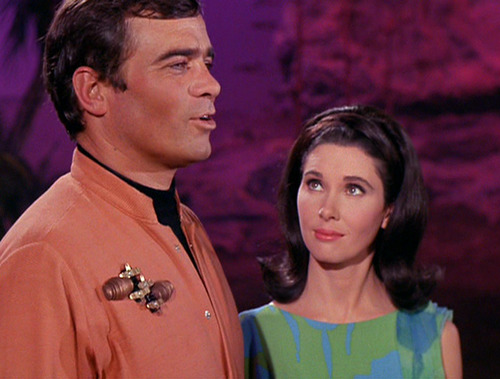
There are some really nice touches in this episode. For example, near the end when Nancy/Companion lifts her scarf over her eyes we see that it’s similar to the appearance of the energy being. I also like how Spock, Kirk and McCoy all have clearly-defined roles that complement each other and the plot.
But mostly I want to talk about “Metamorphosis” as an example of how TOS was both ahead of its time and a product of its time, in terms of its representation of women.
Right off the bat I was really impressed with the character of Commissioner Hedford. We’re given the opportunity to recognize she’s attractive without half her outfit being cut out, plus she’s clearly in an important job that commands respect. She’s upset and angry about being taken away because of her illness:
I was sent to Epsilon Canaris Three to prevent a war, Doctor. Thanks to the inefficiency of the medical branch of the Starfleet, I’ve been forced to leave before my job was done.
Unfortunately, it was still hard to conceive of a woman character who could be totally fulfilled without finding “true love”, no matter how many wars she might avert.
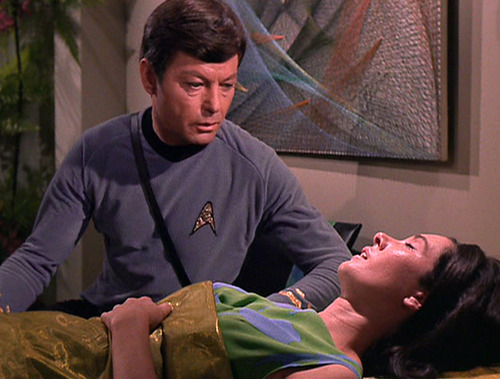
I don’t want to die. I’ve been good at my job, but I’ve never been loved. Never. What kind of life is that? Not to be loved, never to have shown love?
Then there’s the whole “Companion” situation. On one hand, it’s pretty cool that Trek showed there could be love between two beings of very different forms and origins. On the other hand, they did make it clear there’d have to be one man, one woman, and both would (presumably) be heterosexual.
Kirk: Feminine. No doubt about it.
Spock: Yes. The matter of gender could change the entire situation.
Kirk: I’m way ahead of you.
Spock: Then it is not a zookeeper.
Kirk: No. A lover
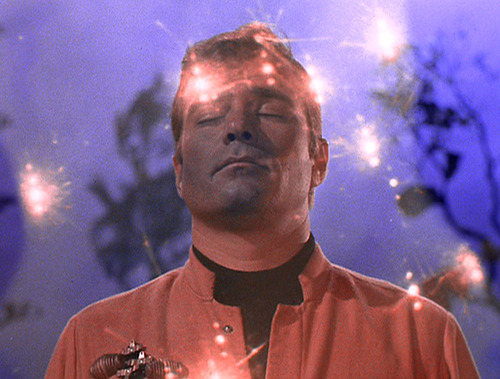
Cochrane can’t even recognize the Companion’s feelings for him until he’s told it’s a she, despite two-hundred years of communing with it in a very intimate way. And when he realizes the truth, everyone acts like it’s a given that he can’t really have a relationship with someone who’s not a human female, or at least looks like one.
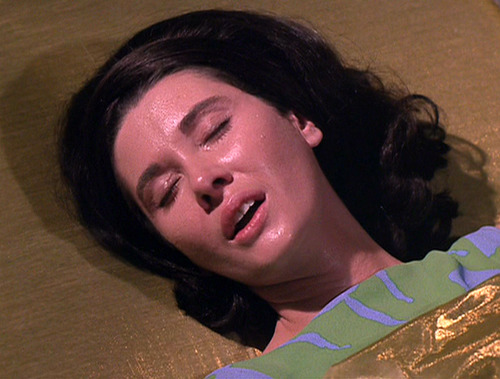
This results in the most questionable part of the episode: the Companion’s taking-over of Nancy Hedford’s body. She says both women are there in the body, but there’s a good chance Nancy wouldn’t be letting an alien being share her body if she wasn’t dying. And she’s only dying because the Companion trapped them on the planet, preventing her from getting necessary medical attention.
Further, Nancy/Companion can never leave the planet, but no one seems much concerned with what family Nancy might have, and when McCoy asks what will happen to the war she was supposed to stop, Kirk kind of shrugs and says:
Well, I’m sure the Federation can find another woman somewhere who’ll stop that war.
Well, I’m reassured.
(At least it’s less icky than the end joke that was apparently planned, which was Spock suggesting to Kirk that Cochrane loving two women in one body might make him a bigamist.)
“Metamorphosis” has some subversive concepts and elements, especially for 1967, but the time it was made also limits its ability to really envision a future where a woman might truly be fulfilled by a meaningful career, or where two people – even aliens – might be able to build a relationship that strays from heterosexual gender norms.
What we learned from this episode:
- The Federation trusts skilled and competent commissioners of all genders to be diplomats and negotiators in potential war zones
- Ladies need to be loved
- Men don’t have the capacity to love things that don’t look like human women
Bechdel-Wallace Test: Fail







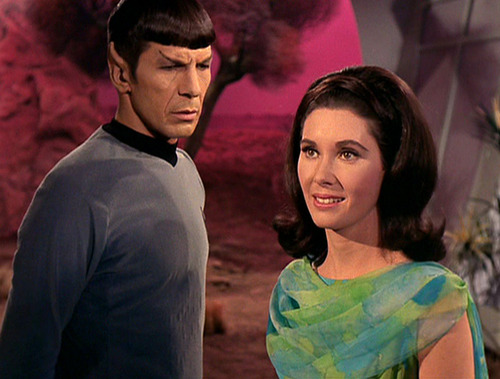
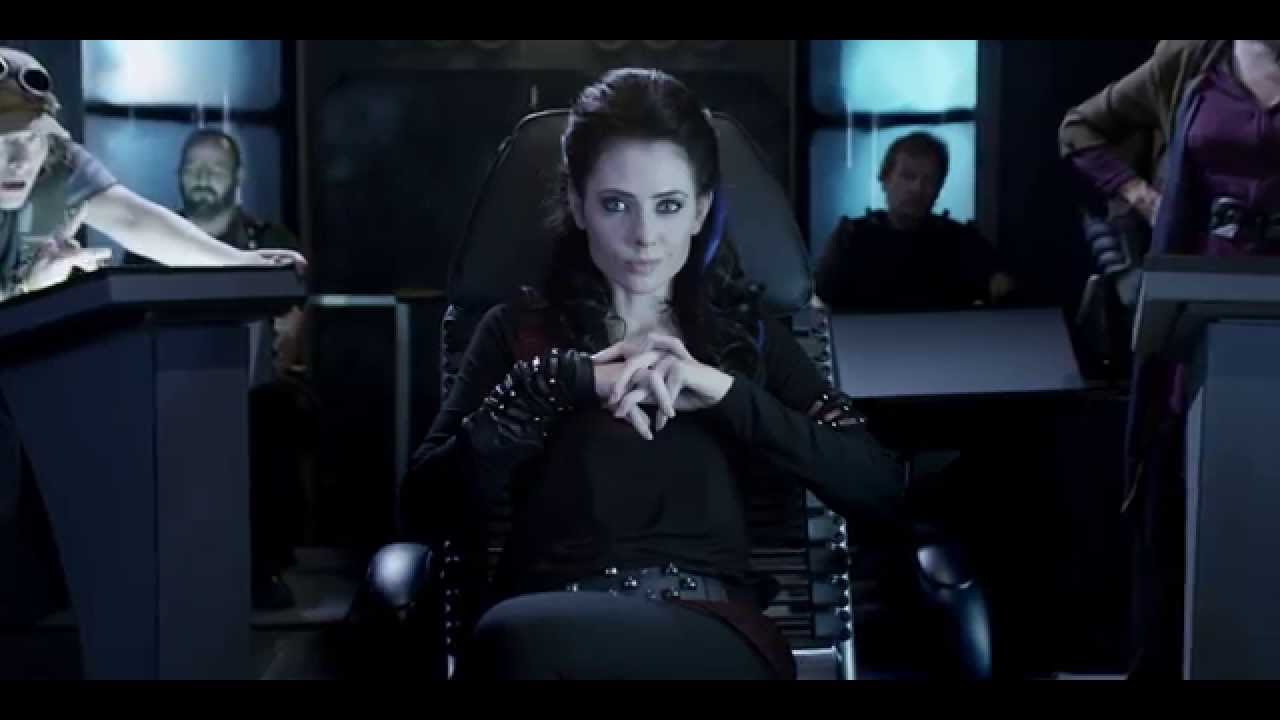



1 Comment
Add Yours →A Google search on a whim for ‘star trek metamorphosis commissioner feminist critique’ led me to this page of yours. Spot on! Star Trek TOS always placed itself just enough out front to claim the progressive mantle, but always toed the conservative line enough not to upset AC Nielsen (and Herb Solow, the backhanded criticisms in “The Way to Eden” and “Bread and Circuses” notwithstanding) and to maintain the status quo- in this regard see also “The Way to Eden” in which the counterculture is both appreciated and portrayed as unrealistically idealistic and misguided by the Timothy Leary analogue Dr Sevrin. One might add to what you’ve written here that it was a foregone conclusion at the time that a commissioner would be caucasian 🙁 .